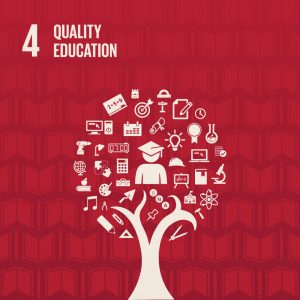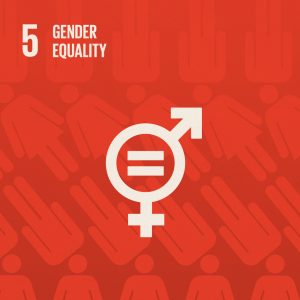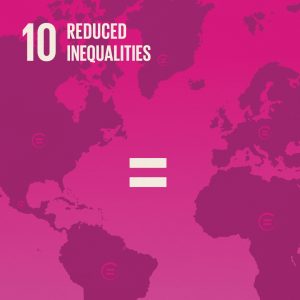by Camille Colter, Office of Sustainability
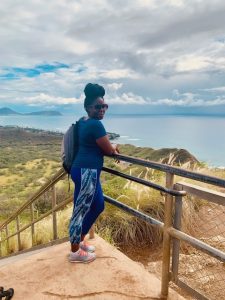
Photo courtesy of Kimberly Mulligan-Guy
Let’s talk about diversity, equity, and inclusion. Wait, scratch that. Inclusion, equity, THEN diversity.
Formally, Dr. Kimberly Mulligan-Guy is the Assistant Dean for Inclusion, Equity, and Diversity (IED) in the College of Science and Mathematics (COSAM). Informally, she is a “space creator,” aiming to give everyone a place to see themselves in science, technology, engineering, and math (STEM). Kimberly is a Black woman in an academic space, which shapes her self-image because she understands the importance of others seeing her. Next, she is a chemist and physiologist. Outside of science, she is a fashion enthusiast that loves shopping at consignment stores – a sustainable alternative to buying new. Kimberly is also consistently looking for new ways to learn and grow, whether through reading, listening to podcasts, or traveling.
If you didn’t notice, Kimberly’s office is the Office of Inclusion, Equity, and Diversity (OIED). This name is a purposeful reordering of diversity, equity, and inclusion. When emphasizing diversity, people get caught up in the question of “how many?” and not “are we making people feel included?” and “are we giving people equitable spaces and the tools to be successful?”. IED is one of the most important aspects of academics because when we are exposed to people with different backgrounds and varying experiences, we can immerse ourselves in new ideas. Hearing and accepting new perspectives make us more creative, which gives us better ideas.
Because of Kimberly’s expertise, I asked her for insights and feedback on Auburn’s sustainability assessment. In the STARS¹ category of Diversity and Affordability, here are her thoughts on the four subcategories below:
Diversity and Equity Coordination: Auburn University has a central office of inclusion and diversity, with every college having a “DEI representative”; however, COSAM is the only college with an actual office and a position like Kimberly’s. Having an OIED makes IED a priority in a different way than having faculty representatives who are additionally busy with other responsibilities and priorities. Kimberly believes creating offices in other colleges with people whose only job is promoting IED and that have a background unique to the college would be a great asset.
Assessing Diversity and Equity: The OIED is continually assessing IED in COSAM. There is a strategic plan in place that asks where they’ve been, where they are, where they want to go, how they are doing, and what they can change. Along with their efforts, Auburn University releases a yearly campus climate survey that gives feedback on how IED efforts are received and where there may be places for improvement.
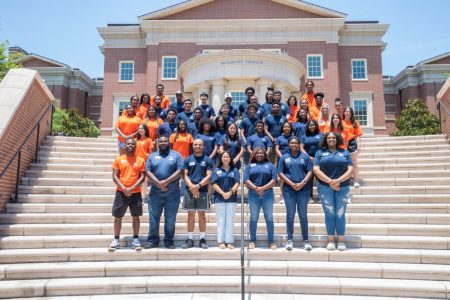
2022 Summer Bridge cohort
Support for Underrepresented Groups: Auburn offers students of underrepresented groups many programs to support them during their time here. There is the Office of Inclusion and Diversity’s Cross Cultural Center for Excellence, the STEM Summer Bridge Program for COSAM and engineering students (celebrating 25 years in 2023), Academic Support, and more. Underrepresented students need to know there are spaces for them and they have someone to go to. In fact, Kimberly is this point of contact for lots of students, even those not in COSAM.
Affordability and Access: Auburn is expensive for a land grant institution, and Kimberly wishes the university could give out more scholarships. Education can help people gain access to higher economic levels. It is important to allow people the opportunity to attend university, and scholarships are essential for this. Should someone have to go into debt for an education? Expenses associated with college also go deeper than tuition – people must live. Scholarships help struggling students access food, water, and shelter.
Inclusion, equity, and diversity are crucial aspects of sustainability. We need diverse voices that offer different ideas to create more sustainable solutions. Equitable sustainability is important. Some people do not have the funds to live more sustainably because every day is about getting to the next. Diverse voices provide greater understanding, leading to a more accessible and affordable movement.
Kimberly hopes that Auburn will create more opportunities and spaces for diverse people to attend university in the future. As a land grant institution, she believes the population of Auburn should be more reflective of the population of the state the university serves. In a broader sense, Kimberly hopes the world will become less divisive. We must begin to understand that helping others does not take from what we have and that there are systemic issues put in place to act against marginalized groups. Finally, Kimberly says, “I want us to listen to understand instead of listening to be understood.”
¹The Sustainability Tracking, Assessment, and Rating System (STARS) program is a self-reporting framework for institutions of higher education to track their sustainability performance created by the Association for the Advancement of Sustainability in Higher Education. Overall, STARS is made up of 211 possible points in 64 different subcategories. The subcategories are grouped by Academics, Engagement, Operations, and Planning & Administration. Additionally, participants may receive extra points for exemplary and innovative practices. In this summary, our score is shown over the amount of possible points for each credit. View Auburn University’s 2022 STARS Report for more details.
Learn about the SDGs & AU and our contributions related to this post.

